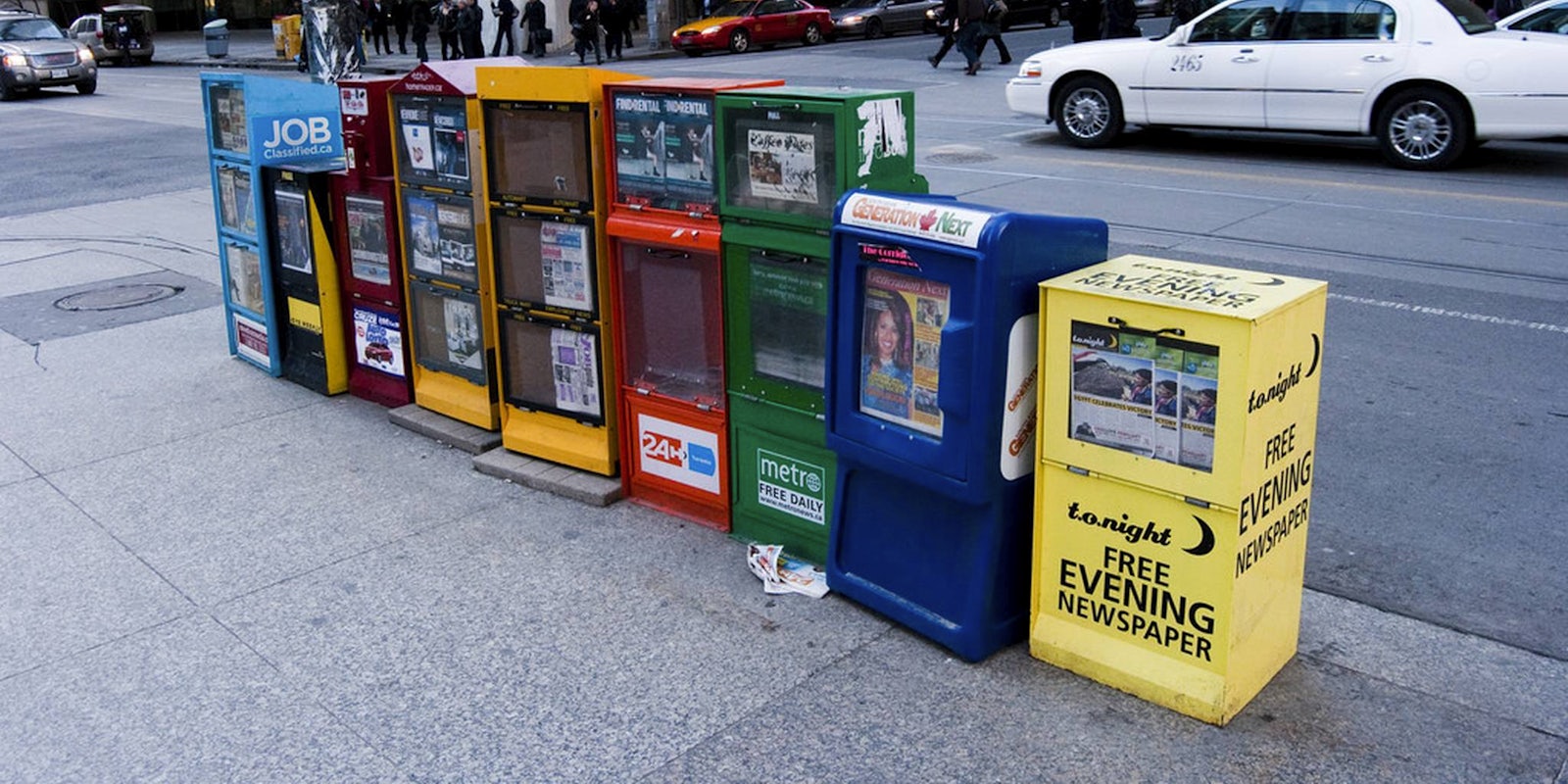Opinion
Ohio Gov. John Kasich finished second in New York’s recent Republican presidential primary, with 25 percent of the vote to Donald Trump’s 60 percent, and the prize of four delegates from Manhattan, versus Trump’s 89 percent.
It seems unlikely anyone on the Kasich campaign, eyeing those results, said: “Thank God for the New York Times.”
The Gray Lady was, more or less, among the left-leaning newspapers that have thrown endorsements at Kasich during the Republican primary. The effect is not evident.
The New York Daily News, whose editorial board scored points for aggressively questioning Democratic candidate Sen. Bernie Sanders earlier this month, meanwhile, surprised no one who has tracked the News’ fawning coverage of “Hill” since her Senate run in 2000, by endorsing Hillary Clinton ahead ahead of the state’s Democratic primary. Does anyone think it mattered?
In a time when news breaks on social media, new and old publications muddle the distinction between news and opinion, and successful tweets win more readers than stodgy nods from the local paper of record. The idea of newspaper editorials dispensing wisdom through unsigned assertions of what “must” or “should” occur seems outdated. Publications telling Americans who they ought to vote for, especially Americans whose political views the editorial writers do not share, seems downright embarrassing.
@JohnKasich @blakehounshell @nytimes “wow, the NYT?!? That seals it, I’m voting for Kasich” – said no Republican ever
— 𝘫𝘦𝘳𝘦𝘮𝘺 𝘭. (@Jeremy10036) January 30, 2016
Do the New York Times editorial board members think Republican primary voters seek their opinion? Why do papers still bother?
There are three ways to look at newspaper endorsements. First, how do they help candidates? Second, how they help readers? Third, how they serve the publications that write them?
There is limited information on whether newspaper’s endorsements help candidates. That candidates seek them is an indicator, though not a decisive one, that they have value.
Candidates seem to view publications supports as worth getting, but little more. As Stuart Stevens, a former chief strategist for Mitt Romney’s 2012 campaign, said of the presidential endorsement of the conservative-leaning New Hampshire Union-Leader ahead of the state’s’ primary: “What’s the downside?”
Candidates seem to view publications supports as worth getting, but little more.
New Jersey Gov. Chris Christie won the Union Leader’s support in New Hampshire. He finished an embarrassing sixth in New Hampshire, then dropped out of the race. The endorsement clearly did little for Christie, but, the prevailing thinking remains that having it beats not receiving it.
Logic and several studies support the idea endorsements by publication matter most in local, low-profile elections. When voters lack information on who to vote for, they may look to an editorial page whose views they tend to agree with for guidance. Hence, the Washington Post’s endorsement benefits candidates in county races in bluish D.C. suburbs. It matters less in the presidential race.
Many political professionals consider endorsements as a way to “generate credibility for the campaign and help lock down base voters,” Campaigns and Elections Magazine wrote.
A 2013 study by two assistant professors at Dartmouth College and the Massachusetts Institute of Technology found that newspaper endorsements can help congressional candidates when voters conclude “that an endorsing newspaper is ideologically similar to their preferences.”
But the study found endorsements can also hurt. If voters “perceive that the source is ideologically distal” they don’t just ignore the paper’s advice—they “punish” the endorsee by voting for someone else.
That suggests that the Boston Globe and the Concord Monitor and other left-leaning papers with relatively large circulations in New Hampshire did not do Kasich a favor by endorsing him in the New Hampshire’s primary.
Campaign professionals seem to fear a negative editorial more than they value an endorsement.
Readers often assume the editorial views of newspaper publishers and editorial pages extend to newsrooms.
For that reason, candidates, including Donald Trump sitting for an editorial board interview with the New York Times, take time to court publications whose backing they have little chance of winning.
Newspaper readers may gain more from editorial endorsements than the papers do. They get a chance to evaluate the papers’ view, even if that means using it as means to decide who to vote against. Voters also may like the transparency of having the paper’s views on the record.
But that’s a rub for newspapers themselves. With accuracy that varies by the publication, readers often assume the editorial views of newspaper publishers and editorial pages extend to newsrooms. From the Times to the Concord Monitor, papers work to avoid this assumption by erecting Chinese walls and other rhetorical edifices between their editorial pages and reporters.
The problem is that no one, including many of the reporters involved, quite believe them. News coverage may be completely independent: Recall that the New York Times led news coverage, and erred, by too aggressively reporting on Hillary Clinton’s private email accounts. But endorsements that tell the public what the paper’s editorial board—typically a small group of writers codifying a publisher’s views—thinks inevitably drive readers to conclude that the paper’s entire staff labors to convey the same views even in its daily news coverage.
As editorial endorsements lose the appeal they once held, newspapers may be less willing to endure the downside of this tradeoff.
Dan Friedman has worked as senior Washington correspondent for the New York Daily News and reported on Senate and congressional oversight for National Journal. He started his reporting career in Boston. He is a graduate of the University of Pennsylvania and holds a Masters in International Relations from the London School of Economics. Follow him on Twitter @dfriedman33.


